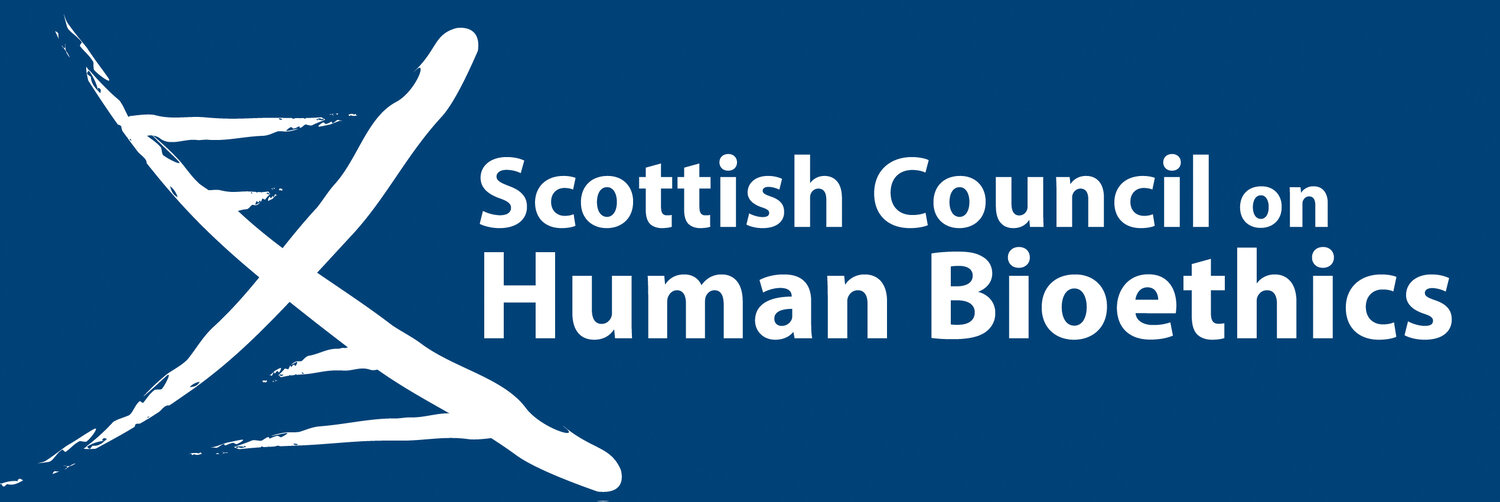2004 Annual Conference - Cloning and the Biotech Future
Date: 17th Jan 04
Organisers: Scottish Council on Human Bioethics, Ethics and Medicine Trust, and the Centre for Bioethics and Public Policy
SCHB participants: Dr George Chalmers chaired, Dr Calum MacKellar gave a presentation entitled "Cloning Legislation in Europe"
Programme:
Cloning and the Biotech Future, the International Debate - Prof.Dr. Nigel Cameron
Cloning Legislation in Europe: A Discussion - Dr. Calum MacKellar
Standing in the Gap of a Human Future or Post-human Future - Ms. Jennifer Lahl
Good Genes, Good Medicine? Lessons of the 20th Century Eugenics Movement - Prof.Dr. Ben Mitchell
Ethical Issues Relating to Genetic Enhancement - Prof.Dr. Henk Jochemsen
SCHB Report
After a short introduction by Dr. George Chalmers concerning the importance of public discussion in the field of bioethics, the different speakers were introduced.
Prof. Dr. Nigel Cameron
The conference began with a presentation from Nigel Cameron covering the international situation with respect to cloning legislation including in Germany and France in which national legislation was at odds with what was being promoted at the UN. In many aspect, he indicated that the cloning procedure was seen by the public as a symbol of things to come in the ethical discussions concerning new biotechnologies and medical developments.
He also indicated that, 20 years ago, the bioethical debates had been concerned with abortion and euthanasia, i.e. the Bioethics I debates. These were all about the taking of human life and were on-going. However, he indicated that we were now experiencing the Bioethics II debate, which was about the making and manipulating of human life, mainly through genetics. Even further ahead, but already on the horizon, Prof. Cameron stated that the Bioethics III debate would take place, which was about the re-making of humanity and the blurring of distinctions between human life and machines.
He concluded by indicating that it was important to go back to basics in defining the source of human dignity which gave human persons their special value.
Dr. Calum MacKellar
The next speaker was Dr. Calum MacKellar from the Scottish Council on Human Bioethics who reviewed the present legislation relating to both therapeutic and reproductive cloning in the Council of Europe as well as in the European Union. He further indicated that not all the reasons supporting the banning of human cloning may yet have been recognised. He emphasised that parents should first seek to understand the reasons behind their aspirations for a child and especially a child 'of their own' (be it a child created through cloning or otherwise). Once these questions had been addressed, Dr MacKellar suggested that cloning would then be seen as an act of unethical creation.
Prof. Ben Mitchell
Prof Ben Mitchell continued by giving the historical context of the eugenics movement during the 19th and the beginning of the 20th century in Europe and the USA.
He then went on to explain how eugenics was the process whereby one sought to improve intelligence, health and "moral character" which includes a strong moral sense, energy and zeal for sustaining work, integrity, trustworthiness and a sense of social obligation.
Society would be divided into three groups: "desirables", "passables", and "undesirables" through Positive eugenics which would include strategies to get the desirables to increase fertility and reproduction and Negative eugenics which would involve discouraging or preventing the undesirables from reproducing.
Prof. Mitchell also indicated that eugenics in America was unfortunately more than an abstract philosophy. The principle of Public Health promotion was put forward in the eugenic proposals including sterilisation.
Ms. Jennifer Lahl
A presentation was then given by Ms. Jennifer Lahl from the Center for Bioethics and Culture in California, USA whereby it was emphasised that many different fires were now burning in different areas of new biomedical and biotechnological developments and that these needed to be addressed. She then underlined the importance of the organisation she represented in trying to bring the different issues to the attention of the interested public.
Prof.Dr. Henk Jochemsen
The final talk of the conference was given by Prof.Dr. Henk Jochemsen on the subject of ethical issues relating to genetic enhancement. In this regard, he indicated that cloning was a genetically more conservative procedure than enhancement which was more progressive than normal procreation.
Enhancement through genetic modification brought about a characteristic exceeding what a person in a healthy state would ever be able to achieve.
Moreover, Prof. Jochemsen reminded participants that the unique individual identity of a person did not only reside in one of the substructures but expresses itself at the various levels and at the same time transcends them in the Self.
Prof. Jochemsen then suggested that human flourishing required (1) respect for structures and limits at bodily level (need for oxygen, food, sleep, range of visible light and audible sound etc.) (2) acceptance of one's 'facts of life' and (3) stable identity requiring continuity and coherence.
Finally, he indicated that the line between healing and enhancement was in practice not always clear and to a certain extent culturally determined. Therefore, it was important to establish a monitoring and regulatory procedure necessary to decide whether enhancement would dehumanise society and whether it would be ethically objectionable.
